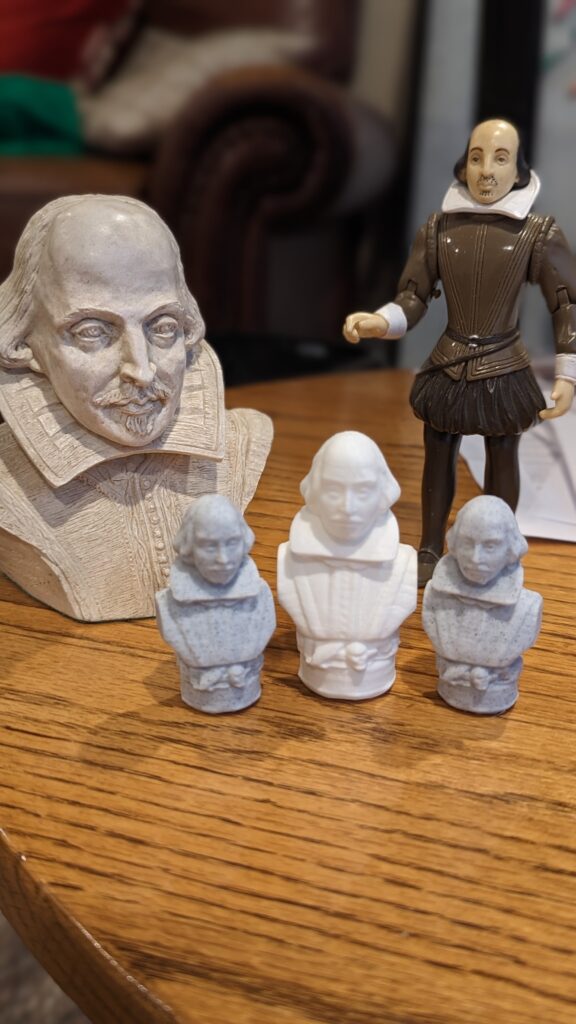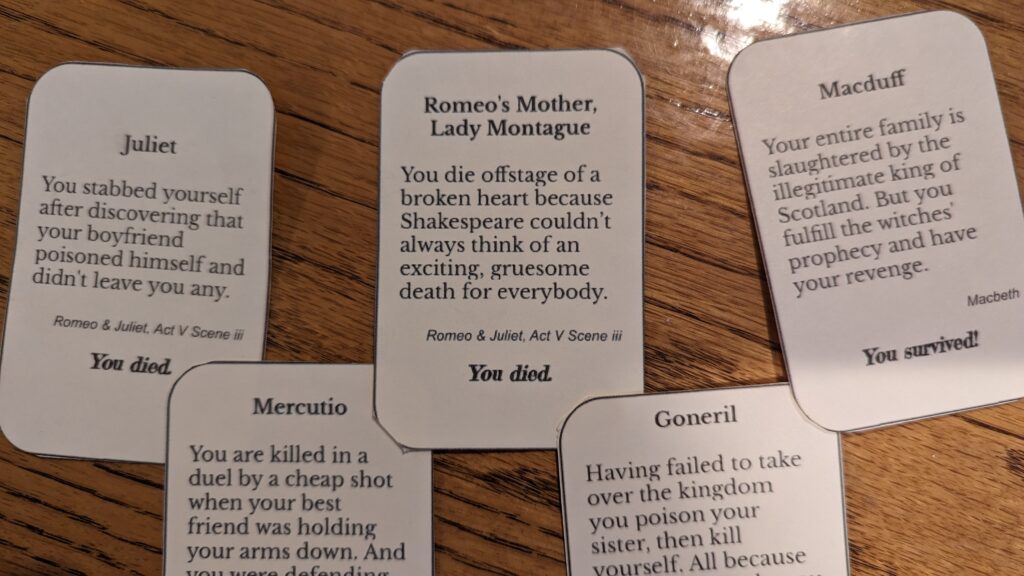A funny thing happened a few months ago. A scary, exciting thing. My two oldest are off to college now, and my third is heading into his final years of high school. His English teacher wrote to me, inviting me to come to speak in her class. Since all three of my kids went through the school, my reputation is well known, at least from a distance. The English department knows that my kids have a Shakespeare geek for a father. But I’ve never actually been in their classroom. We tried to do something a few years ago, but a silly old pandemic got in the way.
Needless to say, I was bouncing off the walls with excitement. I haven’t been in the classroom since my kids were in elementary school, and let me tell you, it’s a whole different animal trying to impress a ten-year-old than a sixteen-year-old. What props would I bring? What would we talk about? The teacher and I bounced around some ideas, generally deciding to focus on the theme of Who am I, and why am I doing this? Why would a fifty-something computer programmer volunteer to go into schools and tell people that Shakespeare is awesome? Great, I thought, I can do that standing on my head.
But I can’t just extemporize for seventy minutes. I needed structure. What to bring, what to bring? So many possibilities! I fretted and I frittered. I went through my children’s lifetime of pictures. I stacked books to bring. I have a 3d printer! I would make things. 3d printed things are cool. What would I make?

Shakespeares, of course, There’s a whole story that goes with these, but I’ll give you the short form. I needed to make at least 25 of *something* because I wasn’t about to bring in giveaways if I didn’t have enough for everybody. There were 20 students, I checked and double checked. So I figured 25 leaves me wiggle room to leave something with the teacher or other friends I see along the way.
Then my printer broke. I had to sent to China for parts, with no way of knowing whether they’d arrive in time, and whether they’d fix the problem when they did arrive. In the meanwhile, after a *lot* of trial and error and messing with settings, I figured that I could print one at a time. Each one took about an hour and a half. So for about five days straight I spent all day printing a single Shakespeare at a time, popping him off the print bed, then immediately starting a new one.
While I was there I also printed some Shakespeare cookie cutters. I couldn’t swing printing 25 of them, though, so I only printed a couple and would figure out later how to give them out.
Lastly I printed something special for the teacher, a “lithophane” of the front page of the First Folio. Lithophanes are this cool technique where you print a translucent image so that it looks like nothing when you hold it normally, but hold it up to the light and it is photographic quality.
My son told me at one point that the teacher had said I was coming, and that the students had checked out my site. I decided to see if anybody was still reading. I left an easter egg in a post that gave them a word and said if you’re the first person to tell me that word and what it means to Shakespeare, I’ll have a prize for you. The word was Corambis, and it’s another name for Polonius.
Games! We should play some games! Yes this is what my thought process was like for a month, enjoying the ride?
We could play Bardle, that was an easy one. I knew they knew about Bardle. But you can only really play that once. They could play Blank Verse, assuming I could get it working. What’s Blank Verse, you say? It’s a Shakespeare Mad Lib game I made a long time ago and has been offline for years. That is, until I brought it back to life in a web-hosted version! It’s small right now, only a couple of puzzles, but you can definitely play it. So, that was two.
Then I did something that was maybe over the top. But hey, who we talking about, here? I invented a new game, on the fly, during a conversation with the teacher. A long time ago I’d made a classroom game called Last Shakespeare Standing that consisted of the whole class taking turns drawing slips of paper from a hat – most of which said “You died from plague” or something equally amusing. The idea was to be the last person standing. At first I thought we could play that, but that’s pretty much random, that’s not really educational. I know that one of the most viral facts about Shakespeare is all the created ways that characters died. A few years back I’d even made bookmarks featuring great Shakespearean deaths. So off the top of my head I turned my game into I Survived A Shakespeare Play. Almost all of the deck features the great deaths of Shakespeare characters – who died, how they died, and in what play. The rules are the same – you draw a card, and try to survive. But wait, I needed some survivors! So I added cards of other characters that survive the play. For a twist at the last minute, and to make it a little less random, I added a rule — you read your death, but not your character name. If your teammates can identify your character based on the description of your death, you survive.
I may have printed cards.

Did I go overboard a little bit? I think I may have. I wrote up something like 80+ cards, researched them to get my Act and Scene right, found a “blank playing cards” layout, formatted them, printed them on card stock, and cut them out. That was way more work than I had really thought through when I started the project. Damn the torpedoes!
I think I was ready. I loaded up my bag with props like a traveling magician. I had:
- my First Folio
- my Shakespeare bust
- my computer, for the slide show and the online games
- 25 miniature Shakespeare 3d printed busts
- half a dozen or so Shakespeare cookie cutters
- a Shakespeare First Folio lithophane
- Shakespeare Death Bookmarks, first created in 2015 (by me)
- Shakespeare baby books, to show that Shakespeare can start literally at birth
- Hamlet in Esperanto, to show that Shakespeare is not bound by language
- several Shakespeare graphic novels and other “plain text” treatments to show the variety of ways you can approach Shakespeare
- my card game
- my copy of Shakespeare Trivial Pursuit, in case we run out of time. I’d decided that we could play students against the teacher and I.
- some random business cards, not because I expected to do any business but because I think they’re cool, there’s a little snippet from the Folio with the quote “Not of an age, but for all time” on them. And my website, of course.
I was never a Boy Scout, but man was I prepared. Or was I? Stay tuned for Part Two!
